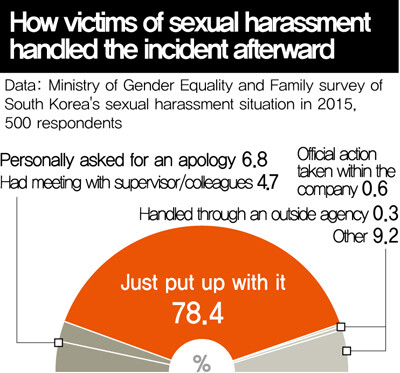hankyoreh
Links to other country sites 다른 나라 사이트 링크
8 out of 10 S. Korean workers experience sexual harassment, most don’t report it

Ms. Kim worked at a small company with 20 employees. In 2014, she suffered sexual harassment by an executive surnamed Nam who was trying to encourage participation in a game during a company workshop. Nam groped Kim’s wrist, sides, and other parts of her body. He had previously engaged in seeming acts of harassment on a routine basis, and Kim reported him to the police.
But it was Kim who ended up having to leave the company. After she refused the company president’s request for her to “settle quietly” with Nam, the president put out an advertisement for her duties and cleared away her desk and office furnishings.
Eight out of ten working people in South Korea have experienced sexual harassment, but chosen to simply tolerate it and not take any action in response, a recent study shows. In many cases, the reason had to do with men’s failure to recognize sexual harassment cases as something that requires a response - which leads many women to believe the problems will go unresolved even if they are reported.

These findings were among those reported on Apr. 5 by the Ministry of Gender Equality and Family from a survey of South Korea‘s sexual harassment situation in 2015. It was the first-ever government-level survey of its kind, with respondents surveyed from 400 public institutions and 1,200 private businesses between April and December of last year. A total of 7,844 public and private employees and 1,615 officers involved in sexual harassment-related duties participated.
The findings showed 6.4% of respondents - 1.8% of males and 9.6% of females - having experienced sexual harassment at their current workplace. Respondents in their twenties were the most frequently victimized at 7.7%, while irregular workers reported more cases than regular workers by an 8.4% to 6.4% margin. The government survey confirmed the prevailing belief that individuals are more likely to be victimized when they are female, younger, and employed in more vulnerable irregular positions.
The most frequently cited forms of harassment included “sexualized analogies and appraisals of physical appearance” (3.9%), “obscene talk and sexual jokes” (3%), and “being forced to pour drinks or sit next to people at company dinners” (2.5%).
Female respondents cited company dinners as the most frequent setting for sexual harassment (44.6%), while males cited the workplace (42.9%).
Respondents rarely took active measures in response to harassment. 392 of the 500 people reported experiences, or 78.4%, said they “put up with it.” Less than 1% of cases resulted in official action within the company (0.6%) or handling through an outside agency (0.3%). Victims personally asked for an apology by the perpetrator in just 6.8% of cases.
Reasons for “grinning and bearing it” differed between genders. Among male respondents, 72.1% said they “did not think it was a serious problem.” Among female respondents, 50.6% said the problem “appeared unlikely to be resolved if the matter was raised.”
A survey of officials in charge of sexual harassment-related duties indicated that as many as one in five cases of sexual harassment result in the victim leaving the workplace. The results showed 35.3% of perpetrators leaving after harassment cases and 20.9% of victims quitting after being harassed.
By Hwangbo Yon, staff reporter
Please direct questions or comments to [english@hani.co.kr]

Editorial・opinion
![[Column] Park Geun-hye déjà vu in Yoon Suk-yeol [Column] Park Geun-hye déjà vu in Yoon Suk-yeol](https://flexible.img.hani.co.kr/flexible/normal/500/300/imgdb/original/2024/0424/651713945113788.jpg) [Column] Park Geun-hye déjà vu in Yoon Suk-yeol
[Column] Park Geun-hye déjà vu in Yoon Suk-yeol![[Editorial] New weight of N. Korea’s nuclear threats makes dialogue all the more urgent [Editorial] New weight of N. Korea’s nuclear threats makes dialogue all the more urgent](https://flexible.img.hani.co.kr/flexible/normal/500/300/imgdb/original/2024/0424/7317139454662664.jpg) [Editorial] New weight of N. Korea’s nuclear threats makes dialogue all the more urgent
[Editorial] New weight of N. Korea’s nuclear threats makes dialogue all the more urgent- [Guest essay] The real reason Korea’s new right wants to dub Rhee a founding father
- [Column] ‘Choson’: Is it time we start referring to N. Korea in its own terms?
- [Editorial] Japan’s rewriting of history with Korea has gone too far
- [Column] The president’s questionable capacity for dialogue
- [Column] Are chaebol firms just pizza pies for families to divvy up as they please?
- [Column] Has Korea, too, crossed the Rubicon on China?
- [Correspondent’s column] In Japan’s alliance with US, echoes of its past alliances with UK
- [Editorial] Does Yoon think the Korean public is wrong?
Most viewed articles
- 1[Column] Park Geun-hye déjà vu in Yoon Suk-yeol
- 2Thursday to mark start of resignations by senior doctors amid standoff with government
- 3Kim Jong-un expressed ‘satisfaction’ with nuclear counterstrike drill directed at South
- 4[Column] ‘Choson’: Is it time we start referring to N. Korea in its own terms?
- 5N. Korean hackers breached 10 defense contractors in South for months, police say
- 6Will NewJeans end up collateral damage in internal feud at K-pop juggernaut Hybe?
- 7Why Korea shouldn’t welcome Japan’s newly beefed up defense cooperation with US
- 8[Editorial] New weight of N. Korea’s nuclear threats makes dialogue all the more urgent
- 9[Guest essay] The real reason Korea’s new right wants to dub Rhee a founding father
- 10[Column] Yoon’s first 100 days should open our eyes to pitfalls of presidential system